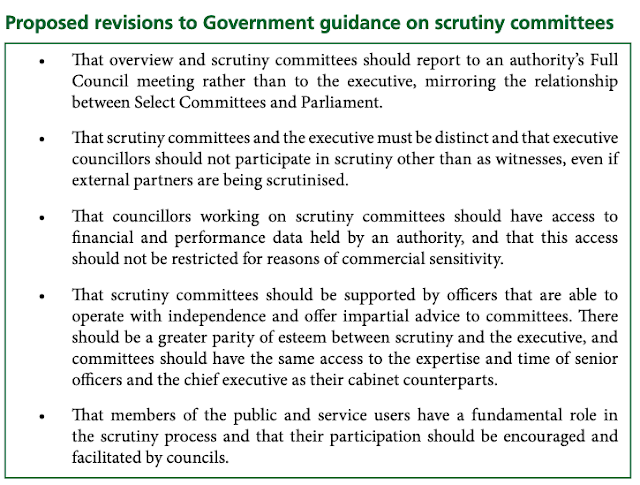 The Annual Meeting of Brent Council which had proceeded with its ceremonies as expected burst into life this week when it considered a Liberal Democrat amendment to the Council Constitution based on their interpretation of the 2017 recommendations of the
House of Commons Communities and Local Government Committee on 'Effectiveness of local authority overview and scrutiny committees '(Extract above) Link to full report.
The Annual Meeting of Brent Council which had proceeded with its ceremonies as expected burst into life this week when it considered a Liberal Democrat amendment to the Council Constitution based on their interpretation of the 2017 recommendations of the
House of Commons Communities and Local Government Committee on 'Effectiveness of local authority overview and scrutiny committees '(Extract above) Link to full report. I have two great Scrutiny Chairs who are doing a superb job...we have no need to make any changes.
Thank you for the advert for democracy in the borough.
If the leader of this council has 'my' chairs of scrutiny in his pocket there can be no confidence that the scrutiny process is independent and fair because of the words he used. Because of the words of the leader we now know that scrutiny is a rubber stamping of everything, a 'yes' to everything and no effective scrutiny.
We have found that the most significant factor in determining whether or not scrutiny committees are effective is the organisational culture of a particular council. Having a positive culture where it is universally recognised that scrutiny can play a productive part in the decision-making process is vital and such an approach is common in all of the examples of effective scrutiny that we identified. Senior councillors from both the administration and the opposition, and senior council officers, have a responsibility to set the tone and create an environment that welcomes constructive challenge and democratic accountability. When this does not happen and individuals seek to marginalise scrutiny, there is a risk of damaging the council’s reputation, and missing opportunities to use scrutiny to improve service outcomes. In extreme cases, ineffective scrutiny can contribute to severe service failures.
Our inquiry has identified a number of ways that establishing a positive
culture can be made easier. For example, in many authorities, there is no
parity of esteem between the executive and scrutiny functions, with a common
perception among both members and officers being that the former is more
important than the latter. We argue that this relationship should be more
balanced and that in order to do so, scrutiny should have a greater
independence from the executive. One way that this can be achieved is to change the lines of accountability, with scrutiny committees reporting to
Full Council meetings, rather than the executive. We also consider how scrutiny
committee chairs might have greater independence in order to dispel any
suggestion that they are influenced by partisan motivations. Whilst we believe
that there are many effective and impartial scrutiny chairs working across the
country, we are concerned that how chairs are appointed can have the potential
to contribute to lessening the independence and legitimacy of the scrutiny process.
The Centre
for Public Scrutiny states that:
Legally, the Chairing and membership of overview and scrutiny committees is a matter for a council’s Annual General Meeting in May. Practically, Chairing in particular is entirely at the discretion of the majority party.
Majority parties can, if they wish, reserve all committee chairships (and vicechairships) to themselves ... the practice of reserving all positions of responsibility to the majority party is something which usually happens by default, and can harm perceptions of scrutiny’s credibility and impartiality.
Chairs from a majority party that are effectively appointed by their executive are just as capable at delivering impartial and effective scrutiny as an opposition councillor, but we have concerns that sometimes chairs can be chosen so as to cause as little disruption as possible for their Leaders. It is vital that the role of scrutiny chair is respected and viewed by all as being a key part of the decision-making process, rather than as a form of political patronage.
Newcastle
City Council where all scrutiny chairs are opposition party members, states
that:
This has taken place under administrations of different parties and we believe that it adds to the clout, effectiveness and independence of the scrutiny process; it gives opposition parties a formally-recognised role in the decision-making process of the authority as a whole, more effective access to officers, and arguably better uses their skills and expertise for the
benefit of the council.


